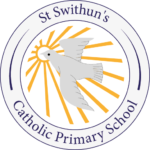Curriculum Overview
At St Swithun’s Catholic Primary School we aim to deliver the foundation subjects through a cross-curricular approach to learning that is exciting, engaging, and challenging. Our curriculum is delivered within the context of our Catholic community and allows each child to develop their gifts and talents alongside their faith in a safe and fun environment.
Our curriculum is constantly evolving as we respond to statutory demands, local opportunities, and the latest research. The requirements of the 2014 National Curriculum are met through a range of experiences, skill development, and knowledge acquisition in engaging and relevant contexts. For more specific details on the curriculum for each half term, please see the ‘jigsaws’ in the phase pages of the curriculum section of the website.
More details on the core subjects, music, and the Early Years’ curriculum can be found by clicking on the relevant page below.
If you wish to find out any further information, please email the headteacher on [email protected].
End of Key Stage Assessments in Y6
Click here to see our latest outcomes for Year 6
Useful Links
The 2014 national curriculum for primary schools can be found here.
In English, there are many terms that may be new to parents. A glossary of those terms can be found at Glossary of Terms
Assessment is based on end of year expectations that are listed in the national curriculum document. We have written booklets for each year group that summarise the end of year expectations in reading, writing and mathematics.
End of Key Stage Assessments in Y2 and Y6
There were no assessments in 2020 and arrangements for 2021 will be added to this page following the parents’ evenings in the spring term.
Science
Science
At St Swithun’s Catholic Primary School, science is taught in line with the national curriculum, with the aim of helping children to develop a foundation for understanding the World. In conjunction with our school topic plans, we have developed a curriculum that develops the children’s skills and understanding, their ability to work scientifically as well as growing their science knowledge. Most lessons involve first-hand experiences and a mix of practical and theoretical knowledge.
As the school has mixed-aged classes the curriculum runs over two years, year X and year Y. Science lessons usually take place weekly, although sometimes may be blocked and delivered over an afternoon and occasionally a whole day. Within these lessons pupils are taught essential aspects of the knowledge, methods, processes and uses of science. Science is taught in distinct blocks, with children focussing on one particular theme per half term. Throughout their time at St Swithun’s, children build up a body of key foundational knowledge and concepts, and are encouraged to recognise the power of rational explanation and develop a sense of excitement and curiosity about natural phenomena. Through engaging lessons, children learn to understand how science can be used to explain what is occurring, predict how things will behave, and analyse causes.
Science at St Swithun’s is a fantastic opportunity for children to apply their learning in mathematics and English, for example by writing scientific reports or producing graphs to show results. In addition to this, children will extend their vocabulary by using specific technical language.
National Curriculum Science – Key aims
KS1 Science
- Most learning should be done through first-hand practical experiences.
- Encourage and enable pupils to experience and observe phenomena. (to look more closely)
- Encouraged to be curious and ask questions about their observations.
- Helped to develop their understanding of scientific ideas using different types of scientific enquiry to answer their own questions including: observing changes over time, noticing patterns, grouping and classifying, carrying out simple comparative tests, using secondary sources of information.
- Begin to use simple scientific language to talk about findings and share this with others in a range of ways.
- Enable pupils to use appropriate secondary sources to find information E.g. books, photographs and videos.
- Read and spell scientific vocabulary at a level consistent with their increasing word reading and spelling knowledge.
Lower KS2 Science
- Enable pupils to broaden their scientific view of the world through exploring, discussing, testing and developing ideas.
- Begin to understand the relationships and functions.
- Help pupils to ask their own questions about their observations.
- Develop pupil’s ability to make some decisions about which type of scientific enquiry will help them to answer their questions, including observing changes over time, noticing patterns, grouping, classifying as well as carrying out comparative and fair tests.
- To find things out using secondary sources of information.
- Draw simple conclusions and use simple language to talk and then write about what they have found out.
- Read and spell scientific vocabulary correctly using their growing reading and spelling knowledge.
Upper KS2 Science
- Enable pupils to develop a deeper understanding of a wide range of scientific ideas.
- Help pupils to explore and talk about their ideas, asking questions and scientific phenomena, analysing functions, relationships and interactions more systematically.
- Enable pupils to encounter more abstract ideas and begin to identify how these help us understand and predict how the world operates.
- Begin to recognise that scientific ideas change and develop over time.
- Enable pupils to select the most appropriate way to answer scientific questions using different types of enquiry including: observing changes over different periods of time, noticing patterns, grouping, classifying, comparative tests, fair tests.
- To find things out using secondary sources of information.
- Draw conclusions based on data and observations.
- Use evidence to justify their ideas and use scientific knowledge and understanding to explain their findings.
- Read, spell and pronounce scientific vocabulary correctly.

